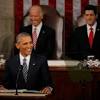 The past and future came together in the nation’s Capitol last night. It was a Paul Gauguin moment: Where do we come from? What are we? Where are we going? The President of the United States gave the best State of the Union speech of his two terms in office, and South Carolina Governor Nikki Haley gave the best opposition response ever. The tone set by both far exceeded what we have heard during this Presidential campaign. Implicit in each was the rejection of the politics of hate.
The past and future came together in the nation’s Capitol last night. It was a Paul Gauguin moment: Where do we come from? What are we? Where are we going? The President of the United States gave the best State of the Union speech of his two terms in office, and South Carolina Governor Nikki Haley gave the best opposition response ever. The tone set by both far exceeded what we have heard during this Presidential campaign. Implicit in each was the rejection of the politics of hate.
It was Barack Obama at his best: clear cut in underlying values, embracing change and laying out challenges. He exuded an optimism worthy of Ronald Reagan’s 1984 Morning in America theme. Obama spoke to the best of what we are, not the worst. Praising the new House leadership, he expressed his hopes for cooperation on criminal justice reform and opioid addiction but let it be known he won’t shy away from immigration reform, gun safety, minimum wage, paid leave and other pet issues. But there was no typical laundry list of programmatic recommendations. Instead, he laid out a thematic vision for the next five or ten years.
In a nod to the frustration of the American people, Obama talked about the global economic trends resulting in people feeling squeezed. Without acknowledging our low level of workforce participation or wage stagnation, he noted how we’ve “made progress but we need to make more.” The only people in the country who can look forward to holding the same jobs and benefits for 30 years are in this chamber, he said. The rest of us mere mortals can’t deny change but must work with it, translating the challenges into opportunities. When the Soviet Union launched Sputnik, we didn’t deny the science but tackled the problem. Twelve years later, we were on the moon. Obama issued a call to reignite the spirit of innovation.
He was, perhaps, least convincing in his first priority, how to keep America safe without either isolating ourselves or being the policemen of the world. The Republicans, who had sat on their hands up to this point, finally stood and applauded when the President declared that “Our troops are the strongest fighting force in the history of the world.” Obama is not wrong that today we are threatened less by evil empires and more by failing states, or that ISIS and other jihadists are killers and fanatics who need to be routed out, hunted down and destroyed. But his words aren’t enough to allay the deep anxieties of the American people. That very morning, they had seen Iran capture ten U.S. navy personnel whose small boats may have ventured into Iranian waters. Though they were released today, the incident recalled the 1979 Iranian hostage situation and the indignity Iran thrust upon Jimmy Carter his last day in office. (Neither the President or Governor Haley mentioned yesterday’s incident.
Uncharacteristically, Obama named as one of the “few regrets of my Presidency” his inability to reduce the rancor in national politics. It has surely grown worse during his two terms, with much fault to be laid at the feet of the Republicans. However, the President was silent on his key role, especially in not reaching across the aisle strategically during his first two years, when Democrats controlled both legislative branches and held a super majority in the Senate, and felt no need for bi-partisanship.
He may be right that change won’t happen until people demand it, but process issues are not what captures the imagination of today’s electorate, whose concerns are their families’ economic well-being, health and security. As the President soared toward the end of his speech, he intoned that “our public life must reflect the goodness and decency I see every day.” That was a page out of candidate Jimmy Carter in 1975 and 1976, but somehow the line worked for Obama last night.
The President was in top form, and wide swaths of the American people needed confirmation that “public life withers when only the most extreme voices get attention.” How gratifying then that Governor Haley also delivered a message different from her party’s candidates’ rancor and acknowledged that Republicans “need to own our part in the growing distrust of Americans.”
Within hours, the candidates were back to lacerating each other, especially excoriating the other party. But for a few shining moments, we could imagine a country that could acknowledge problems but work together to solve them, could be inclusive not fear-driven, could share a vision even while negotiating differences. Sadly, it may be 2017 or well beyond before there’s a whiff of conciliation in the air.
I welcome your comments in the section below. To be alerted when a new blog is posted, click on “Follow’ in the lower right portion of your screen.